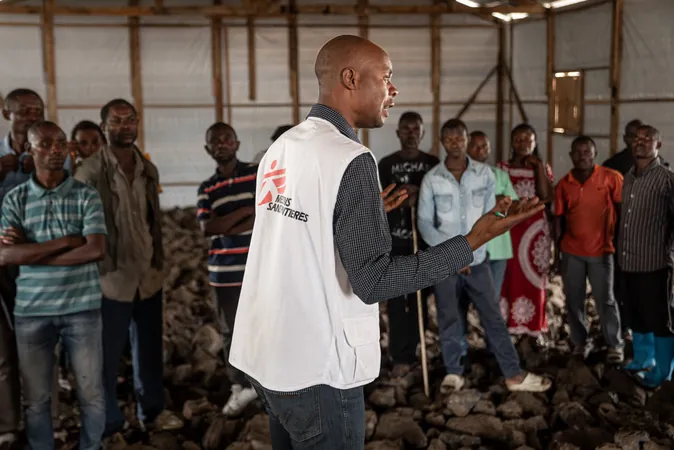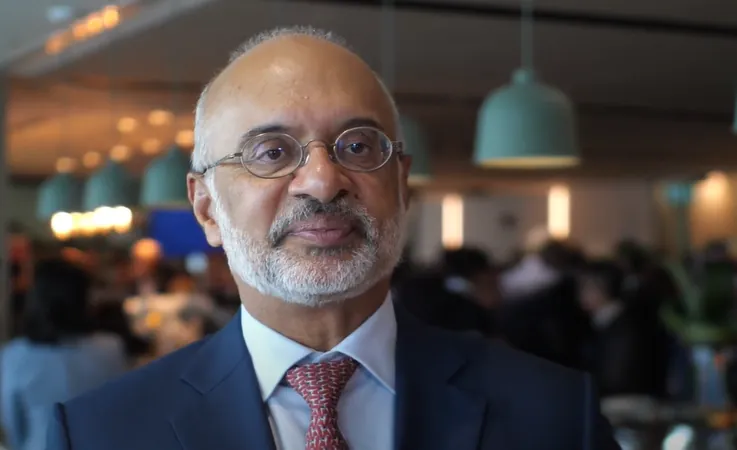
Mpox Crisis in Eastern DRC: An Alarming Addendum in a Region Already Struggling with Chaos
2024-09-16
Author: Yu
Overview of the Mpox Crisis
In recent months, the Democratic Republic of Congo (DRC) has been grappling with a severe mpox epidemic, with more than 20,000 suspected and confirmed cases reported, resulting in over 630 deaths since January 2024. On August 14, 2024, the World Health Organization's Director-General, Tedros Adhanom Ghebreyesus, escalated the situation by declaring this surge a public health emergency of international concern. This alarming declaration followed expert warnings about the potential for the disease to spread beyond African borders, posing a global risk.
Concerns in Goma
Amidst this crisis, citizens in Goma—a city of two million—share a palpable sense of dread about the unknown future. Unlike past outbreaks, which were typically sporadic and concentrated in specific areas, mpox is now infiltrating densely populated regions, escalating concerns for public health.
Nature of Mpox
Mpox, formerly known as monkeypox, has long been endemic in DRC’s northwest and central provinces, where it is typically transmitted through contact with infected rodents. Symptoms encompass skin lesions, fever, and swollen lymph nodes, with most patients recovering within four weeks with appropriate care. However, the recent emergence of a new strain known as 'clade Ib' raises alarms: while it appears less lethal than older variants, it spreads more easily between humans—often without direct contact with infected animals.
Impact on Displaced Populations
In regions like North and South Kivu, where the humanitarian crisis intertwines with the mpox outbreak, the situation is urgent. Many displaced individuals live in dire conditions, lacking basic necessities like food, clean water, and adequate sanitation. Displacement camps, overcrowded and under-resourced, have become breeding grounds for further disease transmission—setting the stage for an mpox crisis to escalate within already vulnerable populations.
Health Risks and Challenges
Health experts warn about the implications for families living in unsanitary conditions. The challenges of implementing preventive measures, such as maintaining proper hygiene, seem insurmountable in makeshift shelters. Malnourished children and women facing high rates of sexual violence compound the issue, as the new variant is transmitted through sexual contact, creating added urgency for public health interventions in these camps.
Criticism of Humanitarian Efforts
Doctors Without Borders (Médecins Sans Frontières, MSF) has condemned the insufficient humanitarian efforts being made to address these living conditions. Reports detail how families in these camps still struggle for basic human rights; it has been more than two years since armed conflicts, particularly with the M23 group, forcibly displaced numerous communities, leaving them at the mercy of hunger and disease.
Voices from the Ground
The powerful testimony of a woman struggling with the consequences of rape highlights the grim reality many face. Living with her seven children under a tattered plastic sheet, she describes the hurdles to basic hygiene, which are crucial for preventing mpox. The idea of self-isolation or proper sanitation becomes unfeasible when you lack soap and clean water. Her story is a stark reminder of how urgent and multifaceted this crisis has become.
Interconnected Health Issues
As mpox adds another layer to the already overwhelming challenges affecting health and safety, other diseases like measles, malaria, and cholera continue to wreak havoc. Therefore, tackling the mpox outbreak requires a nuanced response that harmonizes with addressing wider humanitarian issues.
Necessary Interventions
Critical interventions must include enhancing living conditions for displaced populations by providing access to water, soap, disinfectants, and proper sanitary facilities. While vaccines are being rolled out to combat the spread of mpox, they are not a standalone solution. It is essential for both governmental and non-governmental entities to listen to the affected communities, adapt to their actual needs, and implement strategies that alleviate the overall humanitarian crisis.
Looking Ahead
As MSF continues operations to support prevention, treatment, and awareness in four DRC provinces, including South Kivu and Equateur, the organization remains hopeful that the arrival of vaccines will help mitigate further transmission. However, the fight against mpox is but a single battle in a war against a plethora of interconnected issues plaguing eastern DRC. Thus, addressing mpox must not detract from the focus on immediate and critical humanitarian needs that continue to endanger lives amidst this complex crisis.




 Brasil (PT)
Brasil (PT)
 Canada (EN)
Canada (EN)
 Chile (ES)
Chile (ES)
 España (ES)
España (ES)
 France (FR)
France (FR)
 Hong Kong (EN)
Hong Kong (EN)
 Italia (IT)
Italia (IT)
 日本 (JA)
日本 (JA)
 Magyarország (HU)
Magyarország (HU)
 Norge (NO)
Norge (NO)
 Polska (PL)
Polska (PL)
 Schweiz (DE)
Schweiz (DE)
 Singapore (EN)
Singapore (EN)
 Sverige (SV)
Sverige (SV)
 Suomi (FI)
Suomi (FI)
 Türkiye (TR)
Türkiye (TR)